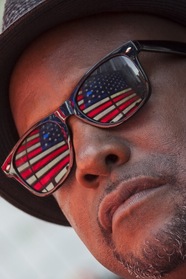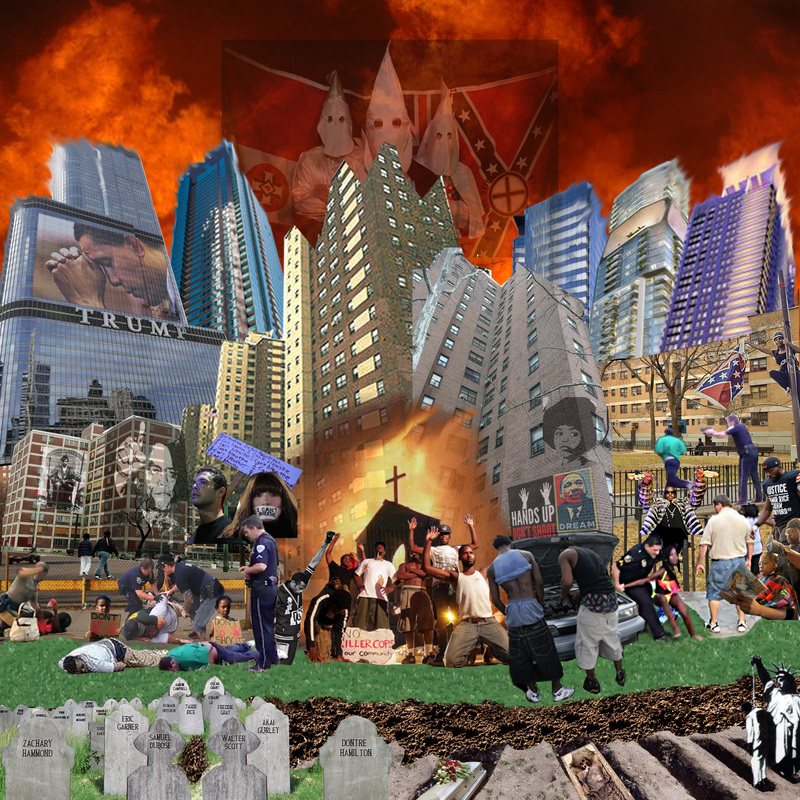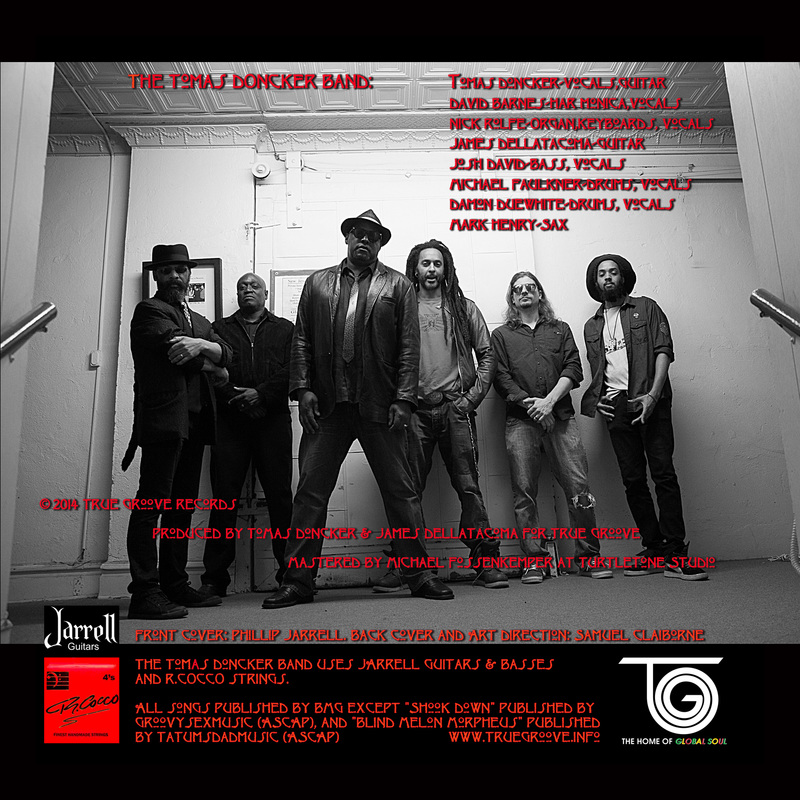True Groove Records: Up and coming record label or
VANITY PRESS?
Tomás Doncker: a charming, brilliant, talented, violent, psychpathic con-man? You decide. - Photo by Samuel Claiborne
Many people have seen Tomas Doncker's rage-a-holic behavior, but he kept it well hidden from me for a long, long time. When it finally burst forth, along with some very shady rip-offs of content I'd generated in good faith, direct lies to my face, and evidence of other unethical (and just plain self-destructive) business practices, I reflected for two days about my relationship, my stake in the company that I'd worked so hard for, that I knew he'd steal from me should I leave, and about my own future as an ethical being. After two days, I decided to call it quits. It was wrenching. The True Groove family was my family. Tomas had been my mentor. But now that the facade had slipped, I knew I had to leave. It was a long two days of meditation and prayer, and during that time I reached out to True Groove Vice-President Marla Mase with my concerns about Tomas' violent threats, to get her perspective on him, and on what I should do. Her answer shocked me: It was in the archetypal voice of a battered woman: "Sure, Sammy, there are times I've been utterly terrified of him but, he only acts like that with the people he really loves!" - Spoken like a true cult member...
Tomas' says all the right things about social justice, meanwhile, he steals from other artists and threatens and terrifies 'the people he really loves'. He's all peace and justice on the outside - hey, I bought it! But underneath is a vicious hustler, a bully, an abuser.
Tomas' says all the right things about social justice, meanwhile, he steals from other artists and threatens and terrifies 'the people he really loves'. He's all peace and justice on the outside - hey, I bought it! But underneath is a vicious hustler, a bully, an abuser.
True Groove Records has the hype, and a roster of dedicated artists. I should know: I was one of them, and there is nothing I wouldn't have done for the label and its founder, Tomas Doncker.
But that was before some very troubling events led me to conclude that I could no longer support True Groove, or Tomas, who was a friend I've known since he was about the age of nine. Once that happened, a lot of things clicked into place, like the endless stream of 'former friends' of Tomas', people he praised one day, then cut off and called talent-less losers the next. The incredible turnover at True Groove, the sheer number of 'exiles' had always troubled me, but I'd always heard only Tomas' side, and given him the benefit of the doubt.
Now I am on the other side, and I've looked at the entire history of my involvement with True Groove, the situation I became slowly locked into as a True Groove artist, what was represented to me, both as an artist on the label, and later as a principle in the company (in charge of promotional materials and the True Groove and Tomas Doncker websites), and I realize I've been duped, through a subtle combination of flattery, suggestive allusions to impending fame and fortune, denigration of any work I've done and any musicians I've worked with outside of the confines of True Groove, and coercive browbeating. I was conned into enrolling myself into a kind of voluntary bondage. And I wasn't alone. But now, you could say, the scales have fallen from my eyes.
Make no mistake: Tomas Doncker is a good producer, and very good guitarist, vocalist, and songwriter. He helped me push past my self-imposed limitations and insecurities, patiently working with me to produce a very good album for True Groove, one that I am very proud of. It was a great help to my confidence, and I think Tomas has done this for other artists as well, and that is a good thing.
But the price is twofold: financial bondage, as detailed below, and psychological bondage: while your insecurities are assuaged as a True Groove artist, they are encouraged on another front: any independence, any thought of perhaps starting your own band or creating any music outside of True Groove is almost universally and vigorously denigrated and derided (this is not true of the True Groove side men - Tomas well knows they need to play with others to make their living - but it does apply to some, if not all, of the True Groove 'artists'), in fact, most anyone you work with outside of the "True Groove Family", and any music you've released outside of True Groove may be casually denigrated - which leads to an almost cult-like insularity and dependence at times. In fact, I would say that this, and other tactics that both cults and pimps utilize, like 'Love-Bombing' are part of vibe at True Groove, where you are actually applauded during rehearsals and praised extravagantly and often.
And of course in my case, Tomas also convinced me to become a 'principal' in True Groove. I worked for 2 years, unpaid, doing work that spanned myriad photo shoots, directing and creating a music video for Marla Mase, designing, creating, and running True Groove's websites, shepherding all of the True Groove artists' CDs through manufacture, designing all True Groove posters, and loads of other tasks from email blasts to CD package design. I even painstakingly digitally restored old, badly scanned photographs as part of a James Chance reissue that I also did all of the design work for. I have been a highly-paid graphics and IT consultant for over 30 years; Even at my 'family rate', this work would have cost True Groove well over $50,000. All I have to show for this is 20% ownership of the company on paper, a 20% I am sure I'll never see, especially if the company is ever worth anything.
Of course, what he got, what I got, is irrelevant; None of it alters the fundamental dynamics of the artist/label relationship. I was just so flattered to be asked to join the label that I refused to really examine those dynamics, refused to listen to all of the questions my inner voice was shouting at me. Once I'd become a principal in the company, I had even less motivation to look at it with anything resembling objectivity. After a series of revelations showed me that I could no longer work with Tomas or True Groove for ethical and professional reasons, as well as personal ones, I woke up and took stock with fresh eyes.
Look under the hood of True Groove, and you don't see a true record label, one that nurtures and grows and invests in its artists. What you see instead is a money-and-prestige generating engine for founder Tomas Doncker, a way for him to support himself while projecting the illusion that True Groove is a real record company, lending him legitimacy and prestige as both a CEO and producer. At True Groove, it's all about Perception=Reality, and the perception is built assiduously...
There is nothing intrinsically wrong with a vanity press. But True Groove doesn't represent itself as such to the world, or to its artists, and therein lies the ethical quicksand...
In some ways, True Groove actually exceeds the traditional vanity press model. Traditionally, you approach a vanity press to get self-published, but here, True Groove approaches you and offers to 'sign' you (oh those magic words!) You are told how picky the label is, how prestigious and dynamic it is, how special you are. It appeals to your vanity, and also your desire to belong, to be accepted.
This is not to say that True Groove artists are not talented - there's a lot of talent on the True Groove roster! But when you cut away all the jive, we all paid to play. We were all invited and flattered and cajoled into paying to play, and pay, and pay...
But that was before some very troubling events led me to conclude that I could no longer support True Groove, or Tomas, who was a friend I've known since he was about the age of nine. Once that happened, a lot of things clicked into place, like the endless stream of 'former friends' of Tomas', people he praised one day, then cut off and called talent-less losers the next. The incredible turnover at True Groove, the sheer number of 'exiles' had always troubled me, but I'd always heard only Tomas' side, and given him the benefit of the doubt.
Now I am on the other side, and I've looked at the entire history of my involvement with True Groove, the situation I became slowly locked into as a True Groove artist, what was represented to me, both as an artist on the label, and later as a principle in the company (in charge of promotional materials and the True Groove and Tomas Doncker websites), and I realize I've been duped, through a subtle combination of flattery, suggestive allusions to impending fame and fortune, denigration of any work I've done and any musicians I've worked with outside of the confines of True Groove, and coercive browbeating. I was conned into enrolling myself into a kind of voluntary bondage. And I wasn't alone. But now, you could say, the scales have fallen from my eyes.
Make no mistake: Tomas Doncker is a good producer, and very good guitarist, vocalist, and songwriter. He helped me push past my self-imposed limitations and insecurities, patiently working with me to produce a very good album for True Groove, one that I am very proud of. It was a great help to my confidence, and I think Tomas has done this for other artists as well, and that is a good thing.
But the price is twofold: financial bondage, as detailed below, and psychological bondage: while your insecurities are assuaged as a True Groove artist, they are encouraged on another front: any independence, any thought of perhaps starting your own band or creating any music outside of True Groove is almost universally and vigorously denigrated and derided (this is not true of the True Groove side men - Tomas well knows they need to play with others to make their living - but it does apply to some, if not all, of the True Groove 'artists'), in fact, most anyone you work with outside of the "True Groove Family", and any music you've released outside of True Groove may be casually denigrated - which leads to an almost cult-like insularity and dependence at times. In fact, I would say that this, and other tactics that both cults and pimps utilize, like 'Love-Bombing' are part of vibe at True Groove, where you are actually applauded during rehearsals and praised extravagantly and often.
And of course in my case, Tomas also convinced me to become a 'principal' in True Groove. I worked for 2 years, unpaid, doing work that spanned myriad photo shoots, directing and creating a music video for Marla Mase, designing, creating, and running True Groove's websites, shepherding all of the True Groove artists' CDs through manufacture, designing all True Groove posters, and loads of other tasks from email blasts to CD package design. I even painstakingly digitally restored old, badly scanned photographs as part of a James Chance reissue that I also did all of the design work for. I have been a highly-paid graphics and IT consultant for over 30 years; Even at my 'family rate', this work would have cost True Groove well over $50,000. All I have to show for this is 20% ownership of the company on paper, a 20% I am sure I'll never see, especially if the company is ever worth anything.
Of course, what he got, what I got, is irrelevant; None of it alters the fundamental dynamics of the artist/label relationship. I was just so flattered to be asked to join the label that I refused to really examine those dynamics, refused to listen to all of the questions my inner voice was shouting at me. Once I'd become a principal in the company, I had even less motivation to look at it with anything resembling objectivity. After a series of revelations showed me that I could no longer work with Tomas or True Groove for ethical and professional reasons, as well as personal ones, I woke up and took stock with fresh eyes.
Look under the hood of True Groove, and you don't see a true record label, one that nurtures and grows and invests in its artists. What you see instead is a money-and-prestige generating engine for founder Tomas Doncker, a way for him to support himself while projecting the illusion that True Groove is a real record company, lending him legitimacy and prestige as both a CEO and producer. At True Groove, it's all about Perception=Reality, and the perception is built assiduously...
There is nothing intrinsically wrong with a vanity press. But True Groove doesn't represent itself as such to the world, or to its artists, and therein lies the ethical quicksand...
In some ways, True Groove actually exceeds the traditional vanity press model. Traditionally, you approach a vanity press to get self-published, but here, True Groove approaches you and offers to 'sign' you (oh those magic words!) You are told how picky the label is, how prestigious and dynamic it is, how special you are. It appeals to your vanity, and also your desire to belong, to be accepted.
This is not to say that True Groove artists are not talented - there's a lot of talent on the True Groove roster! But when you cut away all the jive, we all paid to play. We were all invited and flattered and cajoled into paying to play, and pay, and pay...
Let's take a look at the 'deal' that artists who are 'signed' to True Groove get.
- You pay Tomas Doncker $5000.00 or more (sometimes a lot more) to produce your record.
- Interestingly, he did not produce my entire record: I completely produced (with my friend Craig Hazen, who arranged and played the bass, which was the cornerstone of the song), the cover track 'Hurt', on my album, 'Love, Lust and Genocide'. I recorded all of that song except the drums at my own studio, and Tomas had zero production input on that song, and no input on another as well, The Heart is a Bomb, which James Dellatacoma and I effectively co-produced. James mixed them both, and mixed them brilliantly, as he always does.
- Tomas, true to form, put Hurt down ("You know that's the weakest song on the album") - because anything the artist does outside his purview, his control, he always denigrates. But, although it was nervy and risky to do yet another remake of Hurt, the track subsequently got great reviews.
- In terms of who produced my album, the truth is that Tomas, James and I did equally. I brought in several of the special guests, worked on horn and string arrangements as much as they did, and I was often the one who asked to come back in to change a vocal that Tomas was already happy with but I was not (I think Tomas' biggest weakness as a producer is that he does not take the time to get the best vocals out of some of his artists, myself included - he is always in a rush - as a result, I am happiest with the vocal tracks that I cut slowly and painstakingly at my own studio).
- He gets full 'Produced By' credit, along with James Dellatacoma. The artist gets, at best 'Co-Produced by' credit. In terms of who produced my album, it was really a perfectly-balanced team effort between the three of us, and I pushed for equal billing, which Tomas absolutely refused to give me, so I buckled under, as he knew I would, because I wanted to be on the True Groove label.
- Tomas demands 50/50 songwriting credits on ALL songs, even those he did not co-write. He made major contributions to four of the songs on my album, Love, Lust and Genocide, minor contributions on two others, and NO contributions whatsoever to two of the tracks - no chords, no lyrics, nothing. Yet there he is, credited as a co-writer on every song. Why did I put up with this? Because I was browbeaten into it. And because I wanted to belong... We all want to belong to the True Groove family so badly, and buy into the dream being peddled to us so completely, that we sell (or at least, lease) our autonomy, and any ability to see objectively.
- You, not the label, pay for multi-talented co-producer/engineer James Dellatacoma's time
- You, not the label, pay for each and every studio musician from the True Groove All-Stars in-house band who comes in to cut your tracks, and any other musicians who record on your project.
- You, not the label, pay to have your music mastered.
- You, not the label, pay for promotion, by their promoter, for at least a minimum of 3 months. Like everything else, this is non-negotiable.
- You are required to produce at least one video on your own dime.
- You, not the label, pay someone (that someone was often me, paid a very small amount, way below my normal market rate) to do the design of your CD packaging - unless you are Tomas Doncker, in which case, you take the artwork under false pretenses, then refuse to pay for it.
- You, not the label, pay to have your CDs manufactured.
- EVERY time you gig, you must gig with the True Groove All-Stars (an admittedly AMAZING band), and you, not the label, pay them too. This comes out to between $500.00 and $1000.00 per gig. In fact, sometimes it's worse than that: I recently performed with Tomas and Marla Mase on WHUS, the University of Connecticut's radio station. I played only TWO songs. When the gig was done I was informed I'd have to drop $500.00 to pay for the band (Tomas said that he and Marla also kicked in $500.00 apiece, although I have no way of knowing the truth of this statement). Imagine: $500.00 for TWO SONGS! That was the start of my 'awakening'.
- You cannot form your own band, perhaps with friends who will play for free, for the pure joy of it, because, even though True Groove hasn't given you a dime, and hasn't paid for anything at all, you must 'represent' it with the caliber of musicians approved by Tomas Doncker, and, no surprise here, that means only his band, the True Groove All-Stars, who also happen to perform as The Tomas Doncker band. THIS is why True Groove artists gig so rarely: they can't afford it!
- In short, True Groove gives you no money, and the deal you make requires you to pay for everything, requires you to use and pay for their producer, their engineer, their musicians, their promoter, their mastering facility. These people are all top notch, I would never say otherwise. But you pay for everything, and you assume all the risk. There is no label batting for you, there's only what you pay for, for as long as you can pay for it.
- Interestingly, some of the folks I have spoken to have noted how their intimate and near-daily heart to heart phone talks and email conversations with Tomas (who is a brilliant and fascinating conversationalist) simply disappeared once they stopped booking gigs and making records - their seemingly super-intimate, super-deep friendship turning to vapor once they were no longer pumping money into True Groove's and Tomas' coffers. This is perhaps the most chilling aspect of the entire experience.
- The only thing you don't pay for is studio time, which, apparently, True Groove doesn't pay for either.
- So: Tomas Doncker gets another job, his entire crew get more work paid out of your pocket, he gets to share your royalties, whether he earned them or not, and he gets to represent True Groove as this larger-than-life label with a varied roster of artists.
- The artists essentially volunteer themselves to be cash cows, profit centers, in exchange for a professionally done album released under what appears on the surface to be a traditional record 'label', but one that only 'signs' artists who pay for everything, soup to nuts. Then, one by one, the artists run out of cash and stop recording and performing for True Groove, and, like a cancer, it must spread, 'signing' new acts to keep the cash flowing. Is True Groove a legitimate record label, or something resembling the musical version of a literary vanity press? You decide.
Another Question of Honesty and Integrity:
The CD design and cover artwork for
Tomas Doncker's The Mess We Made
I created several CD packages, including cover art and, often, photography, for Tomas Doncker and never received payment for any of them. Yet every single cover/CD package job I did for ALL OTHER True Groove artists, I was paid for by those artists. And remember, I paid him for his production work. I never agreed to do this work for Tomas for free, and it was not part of my job description when I was a working principle at True Groove; He simply never paid me. And now he is manufacturing T-shirts, and, probably soon, posters, with my art on them, presumably for sale, and I haven't gotten a penny!
So, if you ever read an interview with Tomas Doncker where he talks of all the poor old blues men who were ripped off by their record companies, just remember that he is using my art promotionally on websites and posters, and on his CD, which he sells at gigs, getting ready to sell it on T-shirts and possibly other items, and I don't get a penny for it. Here is the cover image, which I created for his latest release, The Mess We Made, which was just one part of a simply gorgeous CD package I created, replete with Jim Crow era photographs, which took hundreds of hours to research and create, for which I was never paid at all. I hold the copyright for this collage artwork, entitled 'Where We're At', which he is now using without my permission:
Just a small, small sampling of the photography, artwork, graphic design and art direction I did for Tomás Doncker for which I am still owed money:
|
Liner notes/booklet for James Chance:
|
| ||||||
